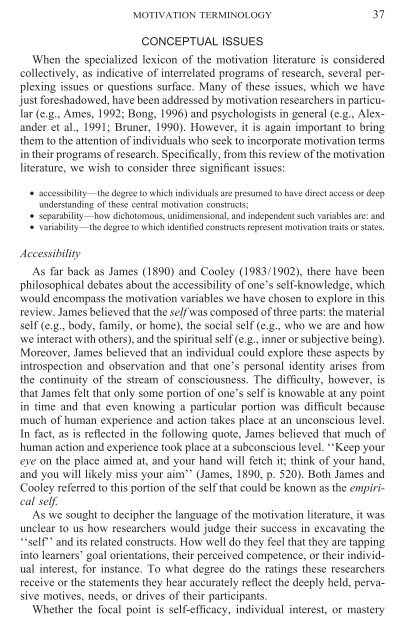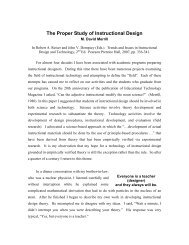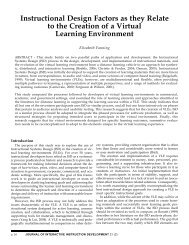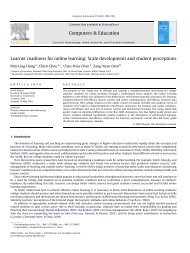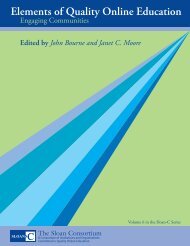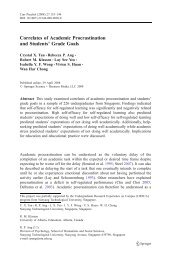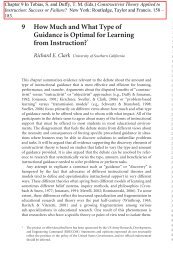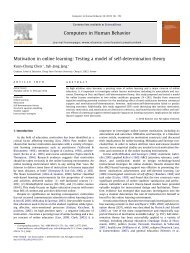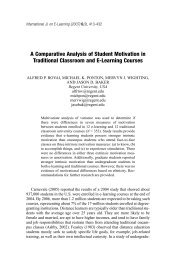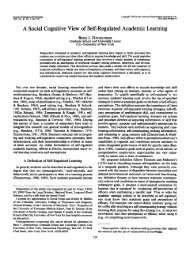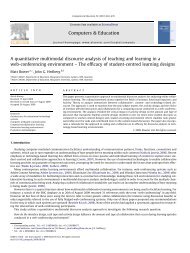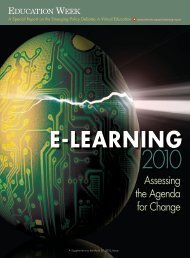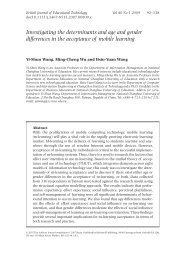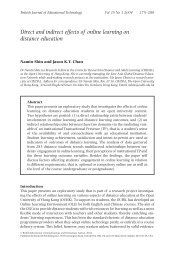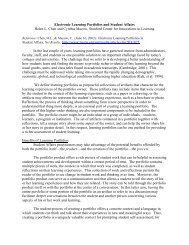A Motivated Exploration of Motivation Terminology - Anitacrawley.net
A Motivated Exploration of Motivation Terminology - Anitacrawley.net
A Motivated Exploration of Motivation Terminology - Anitacrawley.net
You also want an ePaper? Increase the reach of your titles
YUMPU automatically turns print PDFs into web optimized ePapers that Google loves.
MOTIVATION TERMINOLOGY 37CONCEPTUAL ISSUESWhen the specialized lexicon <strong>of</strong> the motivation literature is consideredcollectively, as indicative <strong>of</strong> interrelated programs <strong>of</strong> research, several perplexingissues or questions surface. Many <strong>of</strong> these issues, which we havejust foreshadowed, have been addressed by motivation researchers in particular(e.g., Ames, 1992; Bong, 1996) and psychologists in general (e.g., Alexanderet al., 1991; Bruner, 1990). However, it is again important to bringthem to the attention <strong>of</strong> individuals who seek to incorporate motivation termsin their programs <strong>of</strong> research. Specifically, from this review <strong>of</strong> the motivationliterature, we wish to consider three significant issues:• accessibility—the degree to which individuals are presumed to have direct access or deepunderstanding <strong>of</strong> these central motivation constructs;• separability—how dichotomous, unidimensional, and independent such variables are: and• variability—the degree to which identified constructs represent motivation traits or states.AccessibilityAs far back as James (1890) and Cooley (1983/1902), there have beenphilosophical debates about the accessibility <strong>of</strong> one’s self-knowledge, whichwould encompass the motivation variables we have chosen to explore in thisreview. James believed that the self was composed <strong>of</strong> three parts: the materialself (e.g., body, family, or home), the social self (e.g., who we are and howwe interact with others), and the spiritual self (e.g., inner or subjective being).Moreover, James believed that an individual could explore these aspects byintrospection and observation and that one’s personal identity arises fromthe continuity <strong>of</strong> the stream <strong>of</strong> consciousness. The difficulty, however, isthat James felt that only some portion <strong>of</strong> one’s self is knowable at any pointin time and that even knowing a particular portion was difficult becausemuch <strong>of</strong> human experience and action takes place at an unconscious level.In fact, as is reflected in the following quote, James believed that much <strong>of</strong>human action and experience took place at a subconscious level. ‘‘Keep youreye on the place aimed at, and your hand will fetch it; think <strong>of</strong> your hand,and you will likely miss your aim’’ (James, 1890, p. 520). Both James andCooley referred to this portion <strong>of</strong> the self that could be known as the empiricalself.As we sought to decipher the language <strong>of</strong> the motivation literature, it wasunclear to us how researchers would judge their success in excavating the‘‘self’’ and its related constructs. How well do they feel that they are tappinginto learners’ goal orientations, their perceived competence, or their individualinterest, for instance. To what degree do the ratings these researchersreceive or the statements they hear accurately reflect the deeply held, pervasivemotives, needs, or drives <strong>of</strong> their participants.Whether the focal point is self-efficacy, individual interest, or mastery


